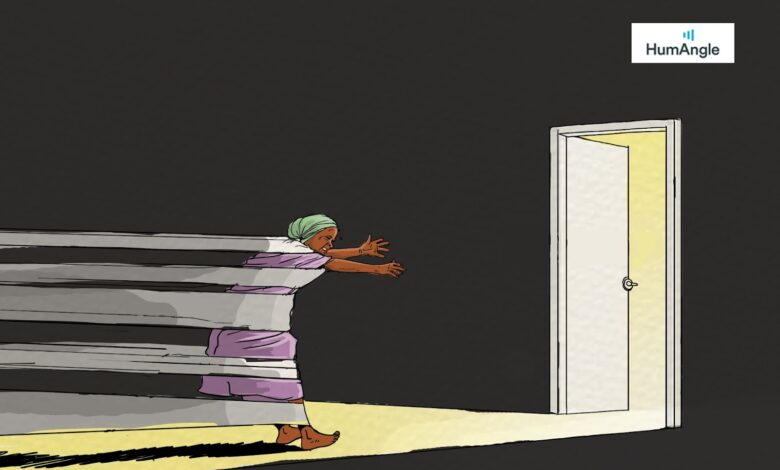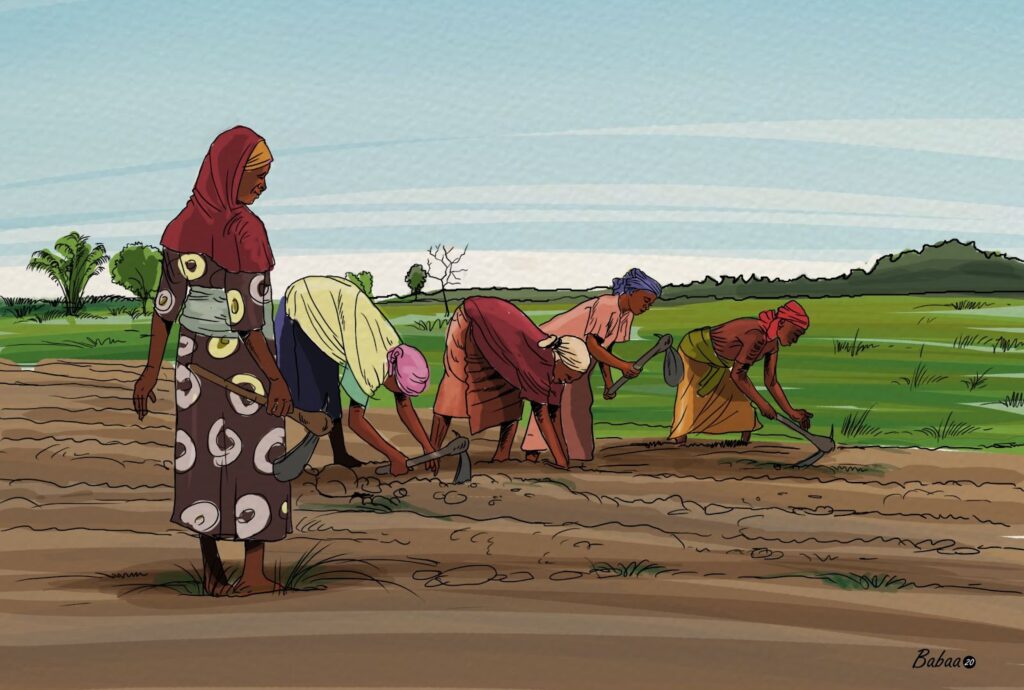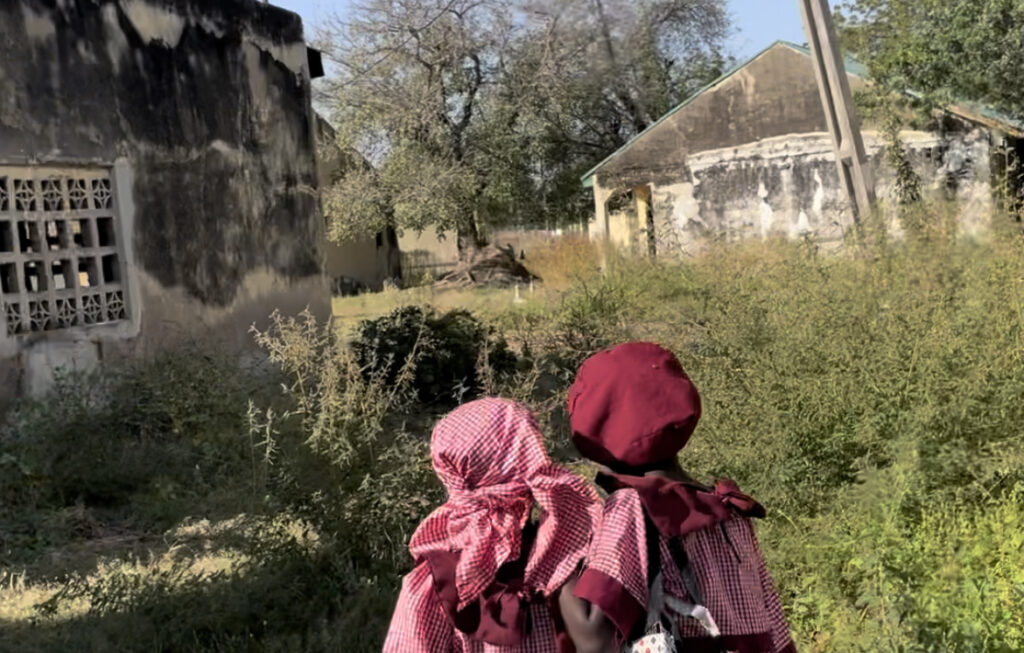A Parent’s Worst Nightmare
Sarah Musa, the mother of the youngest victim of the Birnin Yauri Mass School Abduction, reveals her first daughter’s dream of becoming a paediatrician. But those dreams lie in tatters, the girl was abducted from Federal Government College Birnin Yauri and has not returned.

The sunny afternoon of June 17 met Sarah at the family’s farmland in Agwarra.
She was expecting the arrival of her husband, Musa, to join her on the farm. He usually closed from the school where he taught by 12:00 p. m.
The rainy season had just begun and Sarah was burying guinea corn seeds into the soil when she heard her phone ring.
“Who is calling?” she called out to the girl who was in the shade of a tree, attending Sarah’s infant son Isaac while she sowed the field.

“It is Alhaji Nagalla,” the girl retorted. Nagalla is a well-known commercial driver who works on the road between Agwarra and Yauri.
Although Sarah asked the girl to pick up the phone and hear what he had to say, Nagalla insisted on talking directly to Sarah. She received the phone, puzzled.
“Get up, Maman Bilha!” he shouted at the end of the line. “Do you know that schoolchildren have been abducted?”
Confused by his question, she asked, “which school?”
“Bilha’s School!” he replied.
Sarah immediately cut the call and dialled the phone number of Bilhah’s school guardian, but he did not answer. She tried many more times but received no response. She had already begun to dial her husband’s number when he arrived at the farm. Noticing how terrified Sarah was, he jumped off his motorcycle and ran towards her.
He asked what happened.
Their daughter’s school had been raided by kidnappers, she told him. That was all she knew.
Musa immediately left for Birnin Yauri. He did not know what had happened to his precious daughter.
Doctor’s Calling
Since they got married 15 years ago, Musa and Sarah have lived a humble life in Agwarra town, Niger, North-central Nigeria.
Musa’s meagre monthly earnings as a teacher at a primary school in the nearby Kaila village were not enough to sustain the family and they had to rely on their farmland for subsistence. The couple was not in the best position to enrol their children into expensive private or federal government-owned schools.
Yet, they were determined to make every sacrifice they could to help their first and only daughter, Bilhah, achieve her dream.
From a very young age, the parents noticed Bilhah’s enthusiasm and empathy towards children.
“Whenever she saw a sick child, say, one running a temperature, Bilhah would use a cold towel and lightly massage their body with it. Not just our children. Even the neighbours’ children,” Sarah tells HumAngle.
“Noticing her interests, I would ask Bilhah, ‘what do you want to become in the future?’ And she would respond: ‘Umma, I want to become a children’s doctor, or assist pregnant women,’” she adds.
The parents knew that only a quality education would do.
And so after Bilhah completed her primary education at Central Primary School, Agwarra in 2020, her parents resolved to get her enrolled into a high-ranking secondary school where she could get the quality educational foundation required for pursuing a career in paediatrics.
Luckily, there was just the place, her parents thought.
In 2021, Musa exhausted his hard-earned savings to enrol his daughter at the famous Federal Government College (FGC) Birnin Yauri, Northwest Nigeria. He sold off a portion of his farmland to settle the expenses for Bilhah’s school registration. Bilhah was taken to Birnin Yauri, 39 kilometres away from Agwarra.

Bilhah’s parents believe the College was worth all the sacrifices, it being the highest-ranking secondary school in the area.
Before now, the sacrifices they had to make had only been their work and their savings.
Abduction
At the school premises, Musa joined other parents who were worriedly searching for their children.
The story of what happened that day was passed around from parent to parent: A terrorist gang, under the command of an ill-famed terrorist, Dogo Gide, had stormed FGC Birnin Yauri.
The gang exchanged gunfire with the four police officers they met at the schoolgate, before breaking into the school. They broke in around 12:00 p.m., shooting sporadically. They killed one police officer and injured a number of pupils.
The terrorists took the better part of an hour terrorising the College before they took away more than a hundred students and a few teachers.
Bilhah must have been among them. She was nowhere to be found at the school now.
At the end of the day, Musa retired home without Bilhah. He, however, came with a message, Sarah says.
“The father came home and told me that he couldn’t find Bilhah. But they said some schoolchildren have escaped to the bushes surrounding the school. They are being recovered one after another. So, we should be patient. By the next morning, they could find her.”
The next day, Musa went back to the school again. Then, he was assured that since it was already 24 hours later, any of the schoolchildren that were yet to be seen had definitely been abducted by the terrorists.
Musa’s return without Bilhah was the beginning of the family’s journey through excruciating pain, Sarah explains.
“The moment I saw him and noticed he was not with her (Bilhah), before he even stopped his motorcycle, I was sure that she was among the kidnapped children. Otherwise, he would have come home with her. From then, I became intensely perturbed and deeply worried. To this day, only God knows the pains we are going through.”
Nine months of pain
Many of the abducted school children began reaching their families through phone as early as June 18, the day after their abduction.
But it would be nine months before the family had any communication with Bilhah, Sarah tells HumAngle.
Even after some of the abductees were released by Dogo Gide in August and October 2021, the family was yet to hear a word on Bilhah’s whereabouts.
This threw Bilhah’s parents into nerve-wracking thoughts. Sarah would imagine to the fringes of her mind, and sometimes she would think Bilhah was dead.
Within a short time, Sarah developed serious blood pressure complications. “As you see me now, I cannot go a day without taking medication,” she says.
“I had no blood pressure problem before Bilhah was abducted; but now, my doctor has become fed up with me. He said he has never seen a blood pressure complication like mine. At one time, my blood pressure ran low to 70. I spent three days receiving drip fluids. My hands got swollen, and the drip tube was transferred to my legs. My blood refused to go up. The doctor too became confused as my body was not responding to treatment.”
As Sarah sustained this ailment, the family continued making efforts to confirm if Bilhah was still alive. They began to reach out to the parents of other abductees.
“I reached out to the mother of Farida Sani Kaoje. I told her I learnt that Farida does call her, and requested that she ask Farida to tell Bilhah to call me if she was alive,” Sarah narrates.
On a fateful day in March 2022, the father of another girl in captivity phoned Bilhah’s mother. He told her that he has given his daughter Ne’empere her phone number. So if Bilhah could not call because she does not know the number, she should now be able to call.
According to Sarah, it was the intervention of Ne’empere’s father that aided her communication with Bilhah.
Phone call
“One Sunday, I was sitting down, deeply buried in my thoughts, when my phone rang. It was a new number. After I answered the call, a female voice uttered into my ears: ‘hello, call me back. Bilhah wants to speak to you.’ My heart skipped a beat. And she cut off the call.”
Sarah immediately called back, but the phone was switched off. She gave the number to a girl she was staying with, and they both kept trying. But they could not reach the number.
Suddenly, Sarah’s phone rang again. It was the same number. Sarah answered the call. And on the other end of the phone came Bilhah’s voice.
“Hello, Umma!” Bilhah shouted. “Bilhah!” the mother responded.
“We both broke down, and none of us could talk,” Sarah recalls.
After a moment, Sarah summoned courage and asked Bilhah to calm down. She asked Bilhah about her whereabouts and wellbeing. Bilhah explained that she was in the terrorists’ camp. “Umma, please help us. Go and plead with the government. Ask them to come and help us out,” Bilhah cried to her mother.
Since then, Sarah says she has been in infrequent contact with her daughter.
In November this year, one of the terrorists phoned Sarah, saying he was Bilhah’s “husband”.
This only confirmed to her a rumour that had earlier gone around that their daughters had been “married off” to some of the terrorists.
The terrorist, suspected to be one of Dogo Gide’s commanders, told Sarah that he was helping Bilhah by getting her “married”. The terrorist audaciously claimed to have saved Bilhah from the ‘evils’ of worldly things by obstructing her education. By “marrying” the child, he claimed, he was bringing her closer to God.
Until she returns, Bilhah’s dream of becoming a paediatric doctor seems to be dashed. The girl who was known for her empathy towards children and enthusiasm towards education now has no other hope than returning home.
Perhaps, she is now more desperate to see her younger brother, who no longer remembers his sister’s face, than to go back to school in pursuit of a paediatric career.
Support Our Journalism
There are millions of ordinary people affected by conflict in Africa whose stories are missing in the mainstream media. HumAngle is determined to tell those challenging and under-reported stories, hoping that the people impacted by these conflicts will find the safety and security they deserve.
To ensure that we continue to provide public service coverage, we have a small favour to ask you. We want you to be part of our journalistic endeavour by contributing a token to us.
Your donation will further promote a robust, free, and independent media.
Donate HereStay Closer To The Stories That Matter




